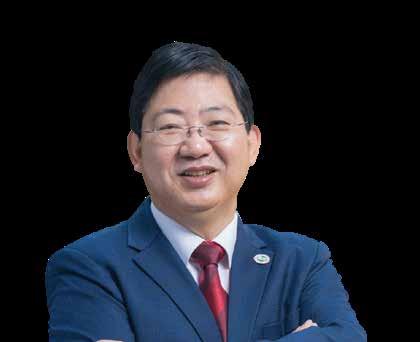
3 minute read
Curriculum and Programmes
by hsuhk_cpao
Programme/Curriculum Development and Enhancement
New and Existing Programme Development
Advertisement
It has always been the strategic objectives of the University to develop undergraduate and postgraduate programmes that support local and regional socio-economic needs and to enhance the curriculum and academic framework of existing programmes to allow more flexibility for diverse study modes.
In the reporting period, two existing bachelor’s degree programmes and four master’s degree programmes passed the reaccreditation exercises and have been recognised for their track records in curriculum development, as well as in teaching and learning outcomes:
‣ Bachelor of Arts (Honours) in Cultural and Creative Industries (BA-CCI),
‣ Bachelor of Science (Honours) in Actuarial Studies and Insurance (BSc-AIN),
‣ Master of Arts in Strategic Communication (MA-SC),
‣ Master of Arts in Translation (Computer-Aided Translation) (MA-TCAT),
‣ Master of Science in Entrepreneurial Management (MSc-EM), and
‣ Master of Science in Global Supply Chain Management (MSc-GSCM).
Apart from refining the curricular of existing programmes, three master’s degree programmes were developed to cater for the social and economic development of the region, namely:
‣ Master of Arts in Theatre Studies (MA-TS),
‣ Master of Arts in English Language Teaching and Assessment (MA-ELTA) ,and
‣ Master of Arts in Chinese (MA-CHI).
Curricula Review
After years of vigorous programme development, Schools/Departments reviewed the curricula of the existing undergraduate and taught postgraduate programmes in 2021-22 to maintain the dynamics and contemporary nature of the study programmes.
To cope with the demand for different modes of programmes, the University has also started to explore the possibilities of offering cross-disciplinary programmes, joint degree programmes and double-major option for students to pursue and graduate with two bachelor’s degrees.
Minor Programme Development
As far as Minor Programmes are concerned, the University offered 24 Minor Programmes for undergraduate students in 2021-22, as compared to 23 in 2020-21. Two existing Minor Programmes have also been modified in the reporting year to cater for the study and intellectual needs of students.
School of Business:
‣ Accounting, Business Administration, Corporate Governance, Finance and Banking, Financial Analysis, General
Business, Human Resource Management, Management, and Marketing
School of Communication:
‣ Communication, and Communication Technology
School of Decision Sciences:
‣ Computing, Decision Analytics, E-commerce, Insurance, Statistical Analysis, and Supply Chain Management
School of Humanities and Social Science:
‣ Asian Studies, Chinese, Cultural and Creative Industries, and English
School of Translation and Foreign Languages:
‣ European Studies, French, German or Spanish, and Translation
Continuous Enhancement of Programme Structure and Quality Assurance Mechanism
With the funding received under the Enhancement and Start-up Grant Scheme (ESGS) for Self-financing Post-secondary Education, the four-year project “FinTech Literacy Enhancement” aims to embed the Fintech quintessential elements into three existing finance-related programmes offered by the University, namely BBA (Honours) in Financial Analysis, BBA (Honours) in Finance and Banking, and BBA (Honours) in Economics, blending in the traditional finance/economic principle with advances in technology. The enhancement covers the management of FinTech, the use of artificial intelligence and selected applications of blockchain in the financial service industry.
The ESGS funding support will facilitate:
(i) the building of an infrastructure for Fintech teaching and learning platform which aims to be the first of its kind among self-financing post-secondary institutions;
(ii) the strengthening of hardware and software infrastructure required for the project;
(iii) the recruitment of experienced and professional staff on FinTech for teaching, curriculum enhancement and system implementation;
(iv) the enhancement of student enrichment programmes and outreach activities; and
(v) the development and strengthening of connections and partnerships with the FinTech community and professional bodies.
Apart from academic discipline study, the University is also committed to sustaining a high standard of English proficiency among the undergraduate students. In 2021-22, the University adopted enhancement measures, to be effective in 202223, for senior-year entrants. These measures operate at three different stages of study:
(i) a mandatory pre-sessional English Language module, namely ENG3000 University English for senior entrants;
(ii) enrolment in Common Core English Language modules, namely ENG2001 English for Academic Purposes and
ENG3002 English for Professional Communication for year-2 and year-3 entrants as appropriate; and
(iii) adjustment of the prerequisites of ENG4000 English Proficiency Course.
Understanding the pivotal importance of quality assurance, the University endeavours to enhance and enforce the Quality Assurance Mechanism (QAM) governing programme development, modifications, as well as other academic/curriculumrelated matters. In 2021-22, the annual review of the QAM was completed and major revisions have been made in the following areas:
‣ approval procedures of providing information to the Hong Kong Council for Accreditation of Academic and Vocational
Qualifications (HKCAAVQ) in fulfilling the pre-conditions/requirements;
‣ updates of Key Profile Indicators (KPIs) of the University and Schools;
‣ module assessment process and items for submission to External Examiner (Module) to facilitate sampling of assessment materials; and
‣ approval procedures of programme modifications for undergraduate and taught postgraduate programmes.







